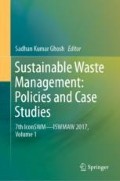Abstract
‘Sanitation and Hygiene’ has been one of the biggest problems for developing and underdeveloped countries. The absence of sanitation and hygiene among the masses leads to different kind of diseases which brings more financial burden to poor families and loss to the countries. The children have been the biggest sufferer as absence of sanitation and hygiene lead to severe health complications. Using education as a tool for behavioural change of children and developing a positive outlook towards hygiene and sanitation of children will result in healthy children as well as clean and hygienic environment.
Padma Kant Jha is looking after Swachh Bharat Mission in NITI Aayog since launch of the Mission and has also supported the Sub-Group of Chief Ministers on Swachh Bharat Abhiyaan on drafting their report. Yogesh Kumar Singh is a Social Development Professional having experience of working on the schemes of Government of India related to drinking water and sanitation along with employment, skill development, housing and social assistance. The views expressed are personal.
Access this chapter
Tax calculation will be finalised at checkout
Purchases are for personal use only
Notes
- 1.
- 2.
- 3.
Burger and Esrey (1995).
- 4.
WHO and Maternal and Child Epidemiology Estimation Group (MCEE) provisional estimates 2015.
- 5.
WHO, 2013.
- 6.
- 7.
Diarrheal diseases among children in India: Current scenario and future perspectives (https://www.ncbi.nlm.nih.gov/pmc/articles/PMC4367049/ accessed on July 10, 2017).
- 8.
- 9.
Report of the Sub-Group of Chief Ministers on Swachh Bharat Abhiyaan, October 2015.
- 10.
Ministry of Human resource Development, Government of India.
- 11.
Water, Sanitation and Hygiene (WASH) in Schools, UNICEF (https://www.unicef.org/publications/files/CFS_WASH_E_web.pdf).
- 12.
Kumar and Pandit (2013).
- 13.
- 14.
Water and Sanitation Programme—Compendium of Best Practices in Rural Sanitation in India.
References
Burger, S., & Esrey, S. (1995). Water and sanitation: Health and nutrition benefits to children. New York: Cornell University Press.
Kumar, V., & Pandit, R. K. (2013). Problems of solid waste management in Indian cities. International Journal of Scientific and Research Publications, 3(3), 1–9.
Author information
Authors and Affiliations
Corresponding authors
Editor information
Editors and Affiliations
Rights and permissions
Copyright information
© 2020 Springer Nature Singapore Pte Ltd.
About this paper
Cite this paper
Jha, P.K., Singh, Y.K. (2020). From Victim to Change Agents—Children as Social Change Agents for Cleanliness and Hygiene. In: Ghosh, S. (eds) Sustainable Waste Management: Policies and Case Studies. Springer, Singapore. https://doi.org/10.1007/978-981-13-7071-7_6
Download citation
DOI: https://doi.org/10.1007/978-981-13-7071-7_6
Published:
Publisher Name: Springer, Singapore
Print ISBN: 978-981-13-7070-0
Online ISBN: 978-981-13-7071-7
eBook Packages: Earth and Environmental ScienceEarth and Environmental Science (R0)

